Skills Series: Reflections On The Job Search Process
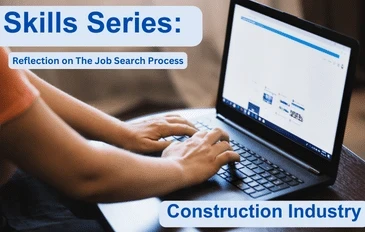
Skills Series: Reflections On The Job Search Process
As you come to the end of your job search in the construction industry, it is important to take some time to reflect on your experiences and the lessons you have learned along the way.
The job search process can be challenging, and it requires a lot of dedication, effort, and perseverance. However, it is also a time of growth and development, where you can learn a lot about yourself, your skills, and your goals
In this final article of the series, we will provide some reflections on the job search process and offer advice for succeeding in the construction industry.
Reflections on the job search process
The job search process is often a time of uncertainty, anxiety, and self-doubt. It can be challenging to navigate the job market, especially if you are new to the industry or if you have not been in the job market for some time. However, it is important to remember that the job search process is a learning experience, and that every experience can help you grow and develop.
One of the most important things to remember during the job search process is to stay focused on your goals. It can be easy to get sidetracked or discouraged by rejection or by the challenges of the job market. However, by staying focused on your goals, you can remain motivated and committed to finding the right job for you.
Another important lesson to learn during the job search process is the importance of networking. Networking is a crucial part of the job search process, and it can help you connect with potential employers and colleagues in the industry. By attending networking events, joining professional organizations, and building relationships with people in the industry, you can increase your chances of finding the right job for you.
Advice for succeeding in the construction industry
Once you have found a job in the construction industry, there are several things you can do to succeed in your career. Here are some tips to help you succeed:
- Focus on continuous learning and development. The construction industry is constantly evolving, and it is important to stay up-to-date with the latest technologies, trends, and best practices. By focusing on continuous learning and development, you can increase your knowledge and skills, and become a valuable asset to your employer.
- Build strong relationships with your colleagues and superiors. Building strong relationships with your colleagues and superiors can help you build a strong support system, and can help you advance in your career. By being a team player, being open to feedback, and showing initiative, you can build strong relationships that will help you succeed.
- Be flexible and adaptable. The construction industry is constantly changing, and it is important to be flexible and adaptable to new challenges and opportunities. By being open to change, and by being willing to learn new skills and take on new responsibilities, you can position yourself for success in the industry.
- Communicate effectively. Effective communication is essential in the construction industry, where collaboration and teamwork are key. By communicating clearly and effectively with your colleagues and superiors, you can avoid misunderstandings and mistakes, and build strong working relationships.
- Embrace technology. The construction industry is increasingly reliant on technology, and it is important to embrace new technologies and tools that can help you work more efficiently and effectively. By staying up-to-date with the latest technologies, you can position yourself as a tech-savvy professional who is ready to take on new challenges and opportunities.
In conclusion, the job search process in the construction industry can be challenging, but it is also a time of growth and development. By staying focused on your goals, networking effectively, and remaining open to new opportunities, you can position yourself for success in the industry.
Michael DeSafey is a leading executive recruiter for professionals in the construction, engineering, and environmental industries. He is currently the President of Webuild Staffing: www.webuildstaffing.com. To learn more about Michael, or to follow his blog, please visit www.michaeldesafey.com.
Skills Series: Advancing Your Career
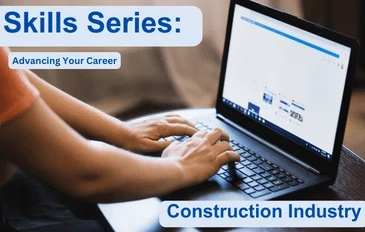
Skills Series: Advancing Your Career
Congratulations, you’ve landed a job in the construction industry! You’ve worked hard to get to where you are, but your journey doesn’t end here. Now, it’s time to start thinking about how you can advance your career and achieve your long-term goals. Whether you’re just starting out or you’ve been in the industry for years, there are always opportunities to grow and develop your skills.
In this article, we’ll discuss strategies for advancing your career in the construction industry, including developing new skills, seeking out mentors, and exploring leadership opportunities.
Developing New Skills
One of the keys to advancing your career in the construction industry is to constantly develop new skills. The industry is constantly evolving, and staying up-to-date with the latest technologies, regulations, and best practices is essential for success. Here are some strategies for developing new skills:
- Take courses and attend workshops: Many construction associations and organizations offer courses and workshops on a variety of topics, from project management to safety to sustainability. Look for opportunities to expand your knowledge and skills in areas that interest you.
- Pursue certifications: Certifications can demonstrate your expertise and knowledge in specific areas of the construction industry. Some common certifications in the industry include LEED (Leadership in Energy and Environmental Design), OSHA (Occupational Safety and Health Administration), and PMP (Project Management Professional).
- Attend conferences and trade shows: Conferences and trade shows are great opportunities to learn about new products, technologies, and trends in the industry. They also offer opportunities to network with other professionals and learn from their experiences.
- Seek out cross-training opportunities: Cross-training allows you to gain experience in different areas of the construction industry. If you’re a project manager, for example, you might seek out opportunities to learn more about estimating or scheduling.
Seeking Out Mentors
Having a mentor can be incredibly valuable for career development. A mentor is someone who has more experience in the industry and can offer guidance and advice based on their own experiences. Here are some tips for finding a mentor:
- Look for someone you admire: Think about professionals in the industry who you admire and respect. Look for someone who has achieved the type of career success you hope to achieve, and who shares similar values and goals.
- Network: Networking is key for finding a mentor. Attend industry events, join professional organizations, and connect with professionals on LinkedIn. Once you’ve identified potential mentors, reach out to them and ask if they’d be willing to meet with you to discuss your career goals.
- Be open to feedback: One of the most valuable aspects of having a mentor is the feedback and advice they can offer. Be open to constructive criticism and take their advice to heart.
Exploring Leadership Opportunities
Leadership opportunities are a great way to demonstrate your skills and expertise in the construction industry. Whether it’s leading a project team or serving on a professional association committee, leadership roles can help you build your professional network and demonstrate your ability to take on new challenges. Here are some strategies for exploring leadership opportunities:
- Volunteer for industry associations: Many professional associations and organizations have committees and task forces that are responsible for organizing events, developing standards, and advocating for the industry. Volunteer to serve on one of these committees to build your professional network and demonstrate your commitment to the industry.
- Take on leadership roles within your company: Look for opportunities to lead projects or teams within your company. This can help you build relationships with colleagues and demonstrate your ability to take on new challenges.
- Attend leadership development programs: Many construction associations and organizations offer leadership development programs that can help you build your skills and knowledge in areas such as communication, conflict resolution, and decision-making.
Michael DeSafey is a leading executive recruiter for professionals in the construction, engineering, and environmental industries. He is currently the President of Webuild Staffing: www.webuildstaffing.com. To learn more about Michael, or to follow his blog, please visit www.michaeldesafey.com.
Category: Career Training, Construction, Interview And Job Search Tips, Jobs
Skills Series: Starting Your New Job
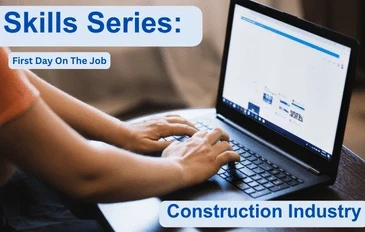
Skills Series: Starting Your New Job:
Starting a new job can be both exciting and overwhelming. In the construction industry, there are many things to learn, people to meet, and projects to become familiar with.
This article will provide strategies for navigating your first days on the job, building relationships with your colleagues, and setting goals for your career development.
These first few days will provide you an opportunity to lay the foundation for a successful career.
Navigating Your First Days
The first few days on a new job can be stressful, but it’s important to make a good impression and get off to a strong start. Here are some strategies for navigating your first days:
- Get organized: Take time to organize your workspace, review company policies and procedures, and familiarize yourself with the company culture.
- Be observant: Observe your colleagues, pay attention to the way they work and interact, and take note of any protocols or procedures that are unique to the company.
- Ask questions: Don’t be afraid to ask questions, clarify expectations, and seek out guidance from colleagues and supervisors.
- Be proactive: Take initiative and seek out opportunities to contribute to projects and team goals, even if it’s just offering to help with a small task.
Building Relationships with Colleagues
Building strong relationships with your colleagues is essential for success in the construction industry. Here are some strategies for building relationships:
- Introduce yourself: Take the initiative to introduce yourself to your colleagues, and make an effort to remember their names and roles.
- Show interest: Show genuine interest in your colleagues’ work and projects, and ask questions to learn more about what they do.
- Be friendly: Be approachable and friendly, and make an effort to participate in social activities and events.
- Collaborate: Look for opportunities to collaborate with your colleagues on projects, and be open to feedback and suggestions.
Setting Goals for Career Development
Setting goals for your career development is important for long-term success in the construction industry. Here are some strategies for setting career goals:
- Assess your strengths and weaknesses: Identify your strengths and weaknesses, and consider areas where you would like to improve.
- Identify opportunities: Look for opportunities to gain new skills and experiences, and consider certifications or training programs that can enhance your expertise.
- Develop a plan: Create a plan for achieving your career goals, including specific milestones and timelines.
- Seek feedback: Seek feedback from colleagues and supervisors, and be open to constructive criticism that can help you grow and develop in your career.
Conclusion
Starting a new job in the construction industry can be challenging, but with the right strategies, you can navigate your first days, build strong relationships with your colleagues, and set goals for your career development. By getting organized, being observant, and asking questions, you can make a strong start in your new role. By introducing yourself, showing interest, being friendly, and collaborating with your colleagues, you can build strong relationships that will help you succeed. And by assessing your strengths and weaknesses, identifying opportunities, developing a plan, and seeking feedback, you can set goals for your career development and achieve long-term success in the construction industry. Remember to be proactive, curious, and open-minded, and you will be on your way to a successful career in construction.
Michael DeSafey is a leading executive recruiter for professionals in the construction, engineering, and environmental industries. He is currently the President of Webuild Staffing: www.webuildstaffing.com. To learn more about Michael, or to follow his blog, please visit www.michaeldesafey.com.
Category: Career Training, Construction, Interview And Job Search Tips, Jobs
Skills Series: Negotiating Salary And Benefits
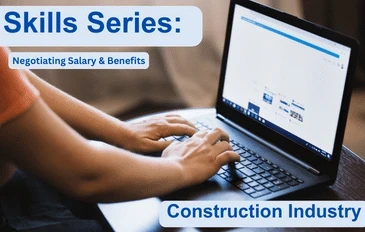
Skills Series: Negotiating Salary And Benefits
Negotiating your salary and benefits can be a daunting task, but it is an essential part of the job search process. In this chapter, we will discuss strategies for negotiating salary, benefits, and work-life balance in the construction industry.
By following these tips and guidelines, you can ensure that you are getting the compensation and benefits you deserve while also maintaining a healthy work-life balance.
Researching Compensation and Benefits
Before you can begin negotiating your salary and benefits, it’s important to do your research. Here are some tips for researching compensation and benefits in the construction industry:
- Check online resources: Websites such as Glassdoor and Payscale can provide insights into average salaries and benefits for specific job titles and locations.
- Talk to your network: Reach out to your professional network to gather information on compensation and benefits at other companies in the industry.
- Consider industry trends: Stay up-to-date on industry trends and changes that may impact compensation and benefits in the construction industry.
- Know your worth: Determine your own value and what you bring to the table in terms of experience, education, and skills.
Negotiating Salary
When it comes to negotiating salary, it’s important to be prepared and confident. Here are some strategies for negotiating salary in the construction industry:
- Know your bottom line: Determine the minimum salary you would be willing to accept and be prepared to walk away if the offer is below that amount.
- Focus on your value: Highlight your experience, education, and skills to demonstrate your value to the company.
- Be flexible: Consider other forms of compensation, such as bonuses or stock options, if the salary offer is lower than expected.
- Practice your negotiation skills: Role-play with a friend or mentor to practice your negotiation skills and build your confidence.
Negotiating Benefits and Work-Life Balance
In addition to salary, benefits and work-life balance are important factors to consider when negotiating a job offer in the construction industry. Here are some strategies for negotiating benefits and work-life balance:
- Identify your priorities: Determine which benefits and work-life balance options are most important to you, such as flexible scheduling or telecommuting options.
- Consider the company culture: Consider the company culture and the types of benefits and work-life balance options that are typically offered.
- Be prepared to compromise: Be willing to compromise on some benefits or work-life balance options if necessary, but be clear about your priorities.
- Ask for what you want: Be upfront about your expectations and ask for the benefits and work-life balance options that you want.
Conclusion
Negotiating salary and benefits can be challenging, but with research, preparation, and confidence, you can ensure that you are getting the compensation and benefits you deserve in the construction industry. By researching compensation and benefits, focusing on your value, and identifying your priorities for work-life balance, you can negotiate a job offer that meets your needs and sets you up for success. Remember to be prepared, flexible, and confident in your negotiation, and don’t be afraid to ask for what you want. With these tips and strategies, you can navigate the negotiation process and take the next step in your career in the construction industry.
Michael DeSafey is a leading executive recruiter for professionals in the construction, engineering, and environmental industries. He is currently the President of Webuild Staffing: www.webuildstaffing.com. To learn more about Michael, or to follow his blog, please visit www.michaeldesafey.com.
Skills Series: Preparing For Interviews
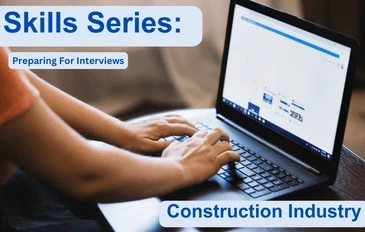
Skills Series: Preparing For Interviews
Congratulations! You have made it to the interview stage of the job search process. Now it’s time to prepare yourself to make a great impression and land the job.
In this article, we will discuss tips and strategies for preparing for interviews in the construction industry, including researching the company, anticipating questions, and presenting yourself professionally.
Researching the Company
One of the most important things you can do to prepare for a job interview in the construction industry is to research the company. By doing so, you can gain a better understanding of the company’s values, mission, and culture, as well as the specific projects and services they offer. Here are some tips for researching the company:
- Review their website: The company’s website is a great place to start. Look for information about the company’s history, mission, and values. Review their portfolio of projects to gain a better understanding of the types of work they do.
- Look for news articles: Search for news articles about the company to get a sense of their reputation and recent developments.
- Check social media: Review the company’s social media accounts to see what they are posting about and how they engage with their audience.
- Network: Reach out to people in your professional network who may have worked with the company before to get insights into their experience.
Anticipating Questions
During an interview, you can expect to be asked a range of questions about your experience, skills, and qualifications. Here are some tips for anticipating and preparing for these questions:
- Review the job description: Review the job description to identify the key skills and qualifications the employer is looking for. Be prepared to provide specific examples of how you meet these requirements.
- Review your resume: Review your resume and be prepared to provide more detail about your skills and experience. Think about specific examples that demonstrate your abilities.
- Practice common interview questions: Practice answering common interview questions such as “What are your strengths?” and “What are your weaknesses?” to feel more confident during the interview.
Presenting Yourself Professionally
During the interview, it’s important to present yourself in a professional manner. Here are some tips for presenting yourself professionally:
- Dress appropriately: Dress professionally for the interview. If you’re not sure what to wear, it’s better to err on the side of being overdressed.
- Arrive early: Arrive at least 15 minutes early for the interview to give yourself time to check in and collect your thoughts.
- Be courteous: Be polite and courteous to everyone you meet, from the receptionist to the interviewer.
- Maintain eye contact: Make eye contact with the interviewer and speak clearly and confidently.
- Follow up: After the interview, send a thank-you note or email to the interviewer to express your gratitude for the opportunity and reiterate your interest in the position.
Conclusion
Preparing for an interview in the construction industry requires research, preparation, and a professional demeanor. By researching the company, anticipating questions, and presenting yourself professionally, you can increase your chances of making a great impression and landing the job. Remember to dress appropriately, arrive early, be courteous, maintain eye contact, and follow up after the interview to demonstrate your enthusiasm for the position. With these tips and strategies, you can confidently prepare for your next job interview and take the next step in your career in the construction industry.
Michael DeSafey is a leading executive recruiter for professionals in the construction, engineering, and environmental industries. He is currently the President of Webuild Staffing: www.webuildstaffing.com. To learn more about Michael, or to follow his blog, please visit www.michaeldesafey.com.
Skills Series: Writing Effective Cover Letters

Skills Series: Writing Effective Cover Letters
In the construction industry, submitting a cover letter along with your resume is a common practice.
A cover letter allows you to introduce yourself to potential employers and provide additional context for your application. In this article, we’ll explore the key elements of an effective cover letter in the construction industry and provide tips for tailoring your cover letter to the job you’re applying for.
Key Elements of an Effective Cover Letter in Construction
When crafting a cover letter for the construction industry, there are several key elements that you should include to make your document stand out. These include:
- Contact Information: Your contact information should be prominently displayed at the top of your cover letter, including your full name, address, phone number, and email address.
- Salutation: Address your cover letter to the specific person who will be reviewing your application. If the job posting does not include contact information, do some research to identify the hiring manager or HR representative for the company.
- Introduction: Your introduction should briefly introduce yourself and explain why you are interested in the position.
- Skills and Experience: In the body of your cover letter, highlight your relevant skills and experience that make you a good fit for the position. Use specific examples and quantify your achievements whenever possible.
- Closing: Your closing should thank the hiring manager for considering your application and provide your contact information for follow-up.
Tips for Tailoring your Cover Letter to the Job
Tailoring your cover letter to the job you’re applying for is essential to stand out to potential employers. Here are some tips for crafting an effective cover letter that highlights your skills and experience:
- Research the company: Before crafting your cover letter, research the company to understand its mission, values, and culture. Use this information to demonstrate your knowledge of the company and explain why you are a good fit.
- Match your skills to the job: Review the job posting and identify the specific skills and qualifications the employer is looking for. Use these as a guide to highlight your relevant skills and experience.
- Use industry-specific language: Using industry-specific language and terminology can demonstrate your knowledge of the construction industry and make your cover letter stand out to potential employers.
- Customize your opening and closing: Tailor your opening and closing paragraphs to the specific company and job you’re applying for. Use this opportunity to demonstrate your knowledge of the company and express your enthusiasm for the position.
- Keep it concise: Your cover letter should be no longer than one page, so it’s essential to keep it concise and focused on the most relevant information.
Conclusion
Crafting an effective cover letter in the construction industry requires attention to detail and a focus on highlighting your skills and experience. By including key elements such as contact information, a salutation, an introduction, skills and experience, and a closing, you can create a compelling document that stands out to potential employers. By researching the company, matching your skills to the job, using industry-specific language, customizing your opening and closing, and keeping it concise, you can increase your chances of securing a job interview and landing your dream job in the construction industry.
Michael DeSafey is a leading executive recruiter for professionals in the construction, engineering, and environmental industries. He is currently the President of Webuild Staffing: www.webuildstaffing.com. To learn more about Michael, or to follow his blog, please visit www.michaeldesafey.com.
Category: Career Training, Construction, Interview And Job Search Tips, Jobs, Resume Writing
Skills Series: Creating A Winning Resume
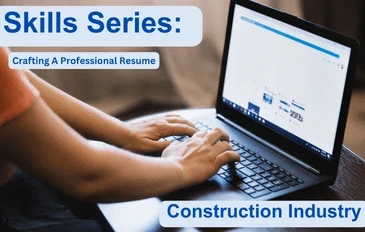
Skills Series: Creating A Winning Resume
In the competitive job market of the construction industry, having a strong resume is essential for securing a job interview. Your resume is often the first impression that potential employers will have of you, so it’s crucial to craft a compelling document that highlights your skills and experience to have a successful job search.
In this article, we’ll explore the key elements of a winning resume in the construction industry and provide tips for crafting a document that will stand out to potential employers.
Key Elements of a Winning Resume in Construction
When crafting a resume for the construction industry, there are several key elements that you should include to make your document stand out. These include:
- Contact Information: Your contact information should be prominently displayed at the top of your resume, including your full name, address, phone number, and email address.
- Objective or Summary Statement: An objective or summary statement should be included near the top of your resume to provide a brief overview of your career goals and qualifications.
- Skills: A skills section should be included to highlight your relevant skills and abilities. This section should focus on technical skills, such as knowledge of construction materials and equipment, as well as soft skills such as communication and teamwork.
- Professional Experience: Your professional experience section should highlight your previous work experience in the construction industry, including job titles, company names, dates of employment, and a summary of your responsibilities and accomplishments.
- Education and Certifications: Your education and certifications should be listed in a separate section of your resume, including the degree or certification earned, the institution or program, and the date of completion.
Tips for Crafting a Winning Resume in Construction
Crafting a winning resume in the construction industry requires attention to detail and a focus on highlighting your skills and experience. Here are some tips for creating a compelling document:
- Tailor your resume to the job: When applying for a job in the construction industry, it’s essential to tailor your resume to the specific job description. Review the job posting carefully and include relevant keywords and phrases in your resume to demonstrate that you have the necessary skills and experience.
- Highlight your achievements: Rather than just listing your job responsibilities, focus on highlighting your achievements in each position. Use specific examples of projects you have worked on, problems you have solved, and outcomes you have achieved.
- Use metrics: Whenever possible, use metrics to quantify your achievements. For example, if you were responsible for managing a project, include details on the budget, timeline, and team size to demonstrate your effectiveness.
- Use industry-specific language: Using industry-specific language and terminology can demonstrate your knowledge of the construction industry and make your resume stand out to potential employers.
- Keep it concise: Your resume should be no longer than two pages, so it’s essential to keep it concise and focused on the most relevant information.
Conclusion
Crafting a winning resume in the construction industry requires attention to detail and a focus on highlighting your skills and experience. By including key elements such as contact information, an objective or summary statement, skills, professional experience, and education and certifications, you can create a compelling document that stands out to potential employers. By tailoring your resume to the job, highlighting your achievements, using metrics, using industry-specific language, and keeping it concise, you can increase your chances of securing a job interview and landing your dream job in the construction industry.
Michael DeSafey is a leading executive recruiter for professionals in the construction, engineering, and environmental industries. He is currently the President of Webuild Staffing: www.webuildstaffing.com. To learn more about Michael, or to follow his blog, please visit www.michaeldesafey.com.
Category: Career Training, Construction, Interview And Job Search Tips, Jobs, Resume Writing
Skills Series: Building Your Professional Network
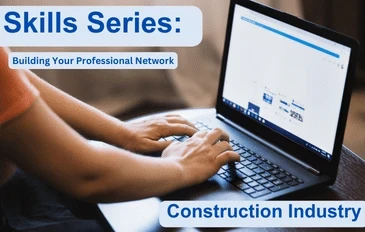
Skills Series: Building Your Professional Network: Developing Connections With Employers, Colleagues, And Industry Associations
Building a strong professional network is critical for success in any industry, and the construction industry is no exception.
In this post, we’ll explore the benefits of building a professional network in the construction industry, strategies for developing connections with employers, colleagues, and industry associations, and how to maintain those connections over time.
Benefits of Building a Professional Network in Construction
Building a professional network in the construction industry has many benefits. These include:
- Access to job opportunities: One of the most significant benefits of building a professional network is access to job opportunities. Knowing people in the industry can help you learn about job openings before they are advertised publicly, and can give you a competitive advantage in the job market.
- Career advancement: A strong professional network can also help you advance your career. Knowing people in high-level positions in the industry can provide you with valuable insights and mentorship opportunities, as well as recommendations for career advancement.
- Industry insights: Building connections in the industry can also help you stay up-to-date on current trends and developments. This can provide valuable insights into the direction of the industry and can help you stay competitive in your field.
Strategies for Developing Connections in Construction
There are several strategies for developing connections in the construction industry. These include:
- Attending industry events: Attending industry events such as trade shows, conferences, and seminars is an excellent way to meet new people in the industry. These events provide opportunities to learn about new developments in the industry and connect with like-minded professionals.
- Joining industry associations: Joining industry associations such as the Associated General Contractors (AGC) or the American Institute of Architects (AIA) can provide you with access to a network of professionals in the industry. These associations often have regular meetings and events where you can connect with other members.
- Participating in online communities: There are many online communities for construction professionals, including LinkedIn groups and industry-specific forums. Participating in these communities can help you connect with people in the industry and learn about job opportunities and industry trends.
- Volunteering: Volunteering for industry-related events or organizations is an excellent way to meet new people in the industry and demonstrate your commitment to your profession. This can help you build relationships with potential employers and colleagues.
Maintaining Your Professional Network
Building a professional network is only the first step. Maintaining those connections over time is critical for their long-term success. Some strategies for maintaining your professional network include:
- Staying in touch: It’s essential to stay in touch with your professional connections regularly. This can be as simple as sending a quick email or making a phone call to catch up.
- Providing value: Providing value to your professional connections can help strengthen your relationships. This can include sharing industry insights, making introductions to other professionals in your network, or providing recommendations for industry events or resources.
- Continuing to learn: Continuing to learn about developments in the industry and staying up-to-date on new trends and technologies can help you provide value to your professional connections and demonstrate your expertise in the field.
Conclusion
Building a professional network in the construction industry is critical for success. By attending industry events, joining industry associations, participating in online communities, and volunteering, you can develop valuable connections with employers, colleagues, and industry associations. Maintaining those connections over time is essential for their long-term success, and can provide you with access to job opportunities, career advancement, and valuable insights into the industry.
Michael DeSafey is a leading executive recruiter for professionals in the construction, engineering, and environmental industries. He is currently the President of Webuild Staffing: www.webuildstaffing.com. To learn more about Michael, or to follow his blog, please visit www.michaeldesafey.com.
Skills Series: Understanding Sectors, Trends and Opportunities in Construction
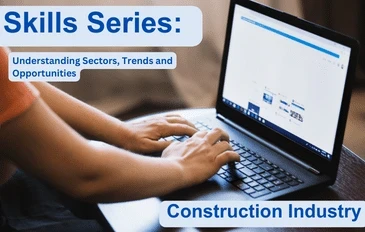
Skills Series: Understanding The Different Sectors, Trends, And Opportunities In Construction
Before embarking on a job search in the construction industry, it’s essential to have a solid understanding of the industry as a whole. This includes knowledge of the different sectors within the industry, current trends, and the opportunities available.
In this article, we will explore various strategies for researching the construction industry, including utilizing industry resources, networking, and attending industry events. By gaining a thorough understanding of the industry, you’ll be better equipped to identify job opportunities that align with your skills and interests.
Understanding the Different Sectors in Construction
The construction industry is made up of various sectors, each with its own unique set of skills and job opportunities. Understanding these sectors is essential for identifying potential job opportunities and career paths.
One of the largest sectors in the construction industry is building construction. This includes the construction of residential and commercial buildings, as well as industrial facilities such as factories and warehouses. Within building construction, there are various roles and specialties, including architects, engineers, project managers, and skilled tradespeople such as carpenters and electricians.
Another significant sector in the construction industry is infrastructure construction. This includes the construction of highways, bridges, airports, and other public infrastructure projects. Within infrastructure construction, there are opportunities for engineers, project managers, and skilled tradespeople such as welders and heavy equipment operators.
Other sectors within the construction industry include specialty trade contractors, such as plumbing and electrical contractors, and heavy and civil engineering construction, which includes the construction of large-scale projects such as dams and water treatment facilities.
Understanding Current Trends in the Construction Industry
Like any industry, the construction industry is subject to trends and changes over time. Understanding these trends is essential for job seekers in the industry, as it can help you identify areas of growth and opportunity.
One significant trend in the construction industry is the increased use of technology. This includes the use of Building Information Modeling (BIM), which is a software tool used for building design and construction management. There is also a growing use of drones and other technologies for construction site monitoring and project management.
Sustainability is also becoming an increasingly important consideration in the construction industry. There is a growing focus on green building practices and the use of renewable energy sources in construction projects.
Understanding Opportunities in the Construction Industry
There are various job opportunities available in the construction industry, from entry-level positions to high-level management roles. Some of the most in-demand positions include project managers, engineers, and skilled tradespeople.
Project managers are responsible for overseeing construction projects from start to finish. They are responsible for budgeting, scheduling, and managing the construction team. Project managers typically have a degree in construction management or a related field and several years of experience in the industry.
Engineers are responsible for the design and implementation of construction projects. They may specialize in areas such as structural engineering, electrical engineering, or mechanical engineering. Engineers typically have a degree in engineering or a related field and several years of experience in the industry.
Skilled tradespeople, such as carpenters, electricians, and plumbers, are also in high demand in the construction industry. These roles typically require specialized training and certification.
Networking and Industry Events
One of the most effective ways to research the construction industry is through networking and attending industry events. This includes attending trade shows and conferences, joining industry associations, and connecting with professionals in the industry.
Attending industry events allows you to learn about current trends and opportunities in the industry, as well as connect with professionals in your field. This can be particularly valuable for job seekers, as it provides an opportunity to learn about job openings and make connections with potential employers.
Michael DeSafey is a leading executive recruiter for professionals in the construction, engineering, and environmental industries. He is currently the President of Webuild Staffing: www.webuildstaffing.com. To learn more about Michael, or to follow his blog, please visit www.michaeldesafey.com.
Skills Series: Assessing Strengths, Weaknesses and Career Goals
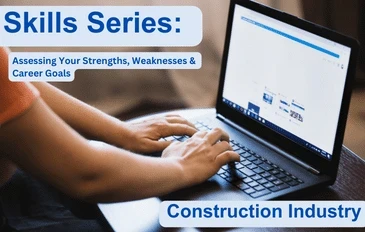
Skills Series: Identifying Your Strengths, Weaknesses, and Career Goals
In the construction industry, it’s essential to have a clear understanding of your skills and interests, as well as your career goals, before embarking on a job search. By taking the time to assess your strengths and weaknesses and identify your career aspirations, you’ll be better equipped to find a job that’s the right fit for you.
In this post, we will explore various strategies and techniques for assessing your skills and interests, including self-reflection, career assessments, and seeking feedback from others. We will also discuss how to identify your career goals and develop a plan for achieving them.
Self-reflection
Self-reflection is an essential component of assessing your skills and interests. Before starting your job search, take some time to reflect on your experiences, skills, and interests. By asking yourself some important questions, you’ll be better equipped to identify your strengths and areas for improvement.
One helpful exercise is to create a list of your skills and experience. This can include your educational background, relevant work experience, and any certifications or training you’ve received. As you create this list, think about the specific tasks you performed in each role and the skills you used to complete them.
You should also consider your personal interests and preferences when it comes to work. Think about the type of work environment you thrive in. Do you prefer working independently or as part of a team? Do you prefer a fast-paced or more relaxed work environment? By considering these factors, you’ll be able to identify roles and companies that align with your interests and preferences.
Another important aspect of self-reflection is identifying your strengths and weaknesses. This can be a difficult exercise, as many people are hesitant to acknowledge their weaknesses. However, it’s essential to have an accurate understanding of your strengths and areas for improvement in order to succeed in the construction industry.
To identify your strengths, think about the tasks or activities that come naturally to you. What are you good at? What do others frequently compliment you on? You can also consider your past experiences, both in the construction industry and in other areas of your life, to help identify your strengths.
To identify your areas for improvement, consider the tasks or activities that you struggle with. What areas do you feel you could use more training or experience in? You can also ask for feedback from others to help identify areas where you could improve.
Career assessments
Career assessments can be a valuable tool for assessing your skills and interests. These assessments can help you identify your strengths and interests, as well as potential career paths that may be a good fit for you.
There are various types of career assessments available, including personality tests, aptitude tests, and interest inventories. Personality tests, such as the Myers-Briggs Type Indicator, can help you understand your personality type and how it relates to different career paths. Aptitude tests, such as the Strong Interest Inventory, can help you identify your natural abilities and skills. Interest inventories, such as the Holland Code, can help you identify your interests and how they relate to different careers.
When taking a career assessment, it’s important to keep in mind that no assessment can fully capture your skills and interests. However, these assessments can provide valuable insight and help guide your career exploration.
Feedback from others
Seeking feedback from others can also be a useful way to assess your skills and interests. Talk to your colleagues, friends, and family members to get their perspective on your strengths and weaknesses. You can also consider asking for feedback from past employers or mentors in the construction industry.
When seeking feedback, it’s important to be open-minded and receptive to constructive criticism. Remember that feedback is intended to help you improve and grow, and that everyone has areas for improvement.
Michael DeSafey is a leading executive recruiter for professionals in the construction, engineering, and environmental industries. He is currently the President of Webuild Staffing: www.webuildstaffing.com. To learn more about Michael, or to follow his blog, please visit www.michaeldesafey.com.
Category: Career Training, Construction, Interview And Job Search Tips, Jobs, Resume Writing
Skills Series: Introduction – How To Find A Job In The Construction Industry
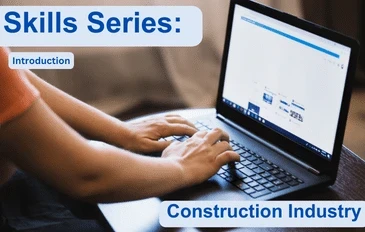
Skills Series: How To Find A Job In The Construction Industry
The construction industry is a critical component of our modern society, playing a pivotal role in building the infrastructure and facilities that support our daily lives. From roads, bridges, and airports to commercial and residential buildings, the construction industry provides essential services that shape the physical environment around us.
The construction industry is also a significant contributor to the global economy, generating billions of dollars in revenue each year and providing employment opportunities for millions of people worldwide. However, finding a job in the construction industry can be a daunting and competitive process, particularly for those who are new to the field or looking to make a career change.
This weekly series of posts is designed to provide a comprehensive overview of the construction industry and the job market, offering practical advice and guidance to job seekers who are seeking employment in this dynamic and exciting field. Whether you are a recent graduate, a seasoned professional, or someone who is new to the industry, this journey will provide you with the tools and knowledge you need to succeed in your job search.
We will begin by exploring the various sectors of the construction industry, including commercial, residential, and infrastructure projects, and the different roles and career paths available within each sector. We will examine the latest trends and innovations in the construction industry, including the increasing use of technology and the shift towards sustainable and environmentally-friendly practices.
Next, we will delve into the job market, examining the current demand for skilled workers in areas such as engineering, project management, and skilled trades. We will also provide an overview of the hiring process, including how to assess your skills and interests, research potential employers, build a professional network, and create a compelling resume and cover letter.
We will then move on to the interview process, offering guidance on how to prepare for interviews, anticipate questions, and present yourself professionally. We will also explore salary negotiation and benefits packages, offering strategies for negotiating effectively and securing the best possible compensation package.
Finally, we will offer advice on how to succeed in your new job, including tips on building relationships with colleagues, setting career goals, and seeking out opportunities for career development and advancement.
Throughout the weeks, we will draw on our extensive experience in the construction industry and our knowledge of the latest industry trends and practices. We will provide practical advice, real-world examples, and actionable strategies that you can use to take your career in the construction industry to the next level.
So, whether you are just starting your job search or looking to take your career in the construction industry to the next level, this series of posts is the perfect resource for you.
So stay tuned each Thursday at 10:am and Let’s get started finding your dream job in the construction industry!
Category: Career Training, Construction, Interview And Job Search Tips, Jobs, Resume Writing
Managing Your Career During a Recession

Managing Your Career During a Recession
A recession is a difficult time for everyone, but it can be especially challenging for those trying to advance their careers. During a recession, businesses are often reluctant to hire new employees or promote existing ones.
As a result, job-seekers may find themselves competing against a larger pool of applicants than would be the case during more prosperous times. And even those who manage to land a job may end up earning less than they could have under better economic conditions. Despite these challenges, there are still ways to advance your career when times are tough.
Stay Up to Date with Industry News and Trends
One of the most important things to do during a recession is to stay current on industry trends and developments. This will ensure that you are well positioned to take advantage of any opportunities that arise during the economic downturn. Knowing what is going on in your field helps you make informed decisions about your career. If you’re a construction worker, for example, you may want to learn about new building methods that could help you get a job in the future. If you’re in engineering, you may want to know about new environmental regulations that could impact your work. By staying up to date with industry news and trends, you can be sure that you’ll be prepared for whatever the future holds.
Keep Your Skills Sharp
It’s important to continually invest in yourself to keep your skills sharp and stay ahead of the curve. One way to do this is to take classes and learn new things. During a recession, many people find themselves unemployed or underemployed. This is the perfect time to hone your skills and learn something new. There are many online courses available through community colleges and adult education programs. You can also take advantage of free resources, such as library books, websites, and podcasts. Investing in yourself will make you better prepared for the next phase of your career.
Network
One of the most essential parts of managing your career during this challenging period is networking. Connecting with other professionals in your field can help you to stay across industry trends and find new job opportunities. In addition, networking can also help you to build relationships with potential employers. Another important step is to make sure your skills are up to date. During a recession, employers may well be more hesitant to hire new employees; however, they may also be more receptive to candidates who can demonstrate that they have the skills that are most in demand in the current job market.
Consider Freelance Work
Another way to manage your career during a recession is to consider freelance work. While full-time jobs may be scarce, there is still a demand for freelance professionals in the construction industry. Construction companies are often more willing to hire freelancers because it helps them save on benefits and office space costs. During a recession, many employers look for workers who are willing to take on different roles or work odd hours. Being open to new opportunities will increase your chances of finding employment during this difficult time. By taking on freelance projects, you can maintain your skills and experience while earning an income. Additionally, freelancing can help you network with other professionals in your field, which may lead to new job opportunities.
Be Proactive
In troubled economic times, it’s more important than ever to be proactive. Don’t wait for your company to lay you off; start looking for another job as soon as possible. Construction companies are often reluctant to lay off staff because it’s expensive and disruptive. They would much rather retain experienced employees who can be deployed when work picks up again. The engineering field is highly competitive, and job prospects can be limited even in the best of economic conditions. However, engineering is also a field that is essential to many industries, and there will always be a demand for qualified engineers. If you’re worried about being made redundant, talk to your boss and see if there’s any way you can be reassigned to a different part of the business. If not, then start looking for new opportunities.
Conclusion
The recession has had a huge impact on many industries, but the construction, engineering, and environmental sectors have been hit particularly hard. If you work in one of these fields, you may be feeling concerned about your career prospects. However, it’s important to stay positive during this time of uncertainty. There are still plenty of opportunities for those willing to look for them. Construction companies are always on the hunt for qualified workers, and there is a growing demand for engineers and environmental consultants. If you’re willing to put in the effort, you can find a job that suits your skills and interests. With a little perseverance, you’ll be able to weather this recession and come out stronger than ever before.
Michael DeSafey is a leading executive recruiter for professionals in the construction, engineering, and environmental industries. He is currently the President of Webuild Staffing: www.webuildstaffing.com. To learn more about Michael, or to follow his blog, please visit www.michaeldesafey.com.
The Construction Career Plan

The Construction Career Plan
In this career plan, we will cover basic incomes and job descriptions from entry-level workers to supervisors and project managers, to general managers and executive-level positions. Construction and engineering encompass a wide variety of jobs; this brief overview aims to give you some examples to help with career planning.
Entry-Level Construction and Craftsmanship
An entry-level worker may earn $10 to $15 per hour. Entry-level workers are tasked with removing debris, distributing materials, maintaining tools, and working at heights. These workers must have a high school diploma or equivalent, and can be a laborer in areas such as carpentry, general contractors, landscaping, painting, commercial construction, flooring and tiling, masonry, roofing, etc.
After four years, they can earn $25 to $45 per hour as a craftsperson. Typically starting as a construction helper, workers may choose to specialize and earn certifications in welding, building scaffolding, or any other specialization. They also have the choice of becoming an apprentice with an electrician, plumber, or carpenter.
Project Supervisors and Project Managers
After a worker develops experience as a journeyman, they can move up to the project manager position. A management degree, such as an MBA, is preferred. Project supervisors earn about $79,000 a year, and project managers earn about $91,000 per year in different markets: power, industrial, water, manufacturing, transportation, petroleum, building, sewers, telecoms, and hazardous waste. Withing those, project supervisors and managers can work on four different types of projects (residential home building, heavy industrial, commercial and institutional, and engineering construction), in six general types of construction subsets (agriculture, residential, commercial, institutional, heavy civil, and environment).
Construction project supervisors are in responsible for establishing a construction plan and implementing it. In addition, their role includes:
- Working to work with vendors and site managers to make sure all problems are taken care of properly
- Coordinating staff and making sure to meet milestones
- Ensuring the projects meet safety and technical specifications
- Taking inventory of supplies, including tools and equipment
- Collecting and analyzing data to make cost and schedule estimates
A parallel role is that of the construction project manager, who comes up with the concept, design, development, and gets contract documents together. Their responsibilities are to:
- Estimate and negotiate costs per project
- Formulate a budget and create the schedule
- Communicate with clients and stakeholders
- Talk to workers about technical and contract details
- Work with building and construction specialists.
General Manager and Top Executives
General managers can earn $84,000 to $150,000 a year. Typically, they have at least an associate’s degree, but many have a bachelor’s degree in construction science, building science, construction management, or engineering. They tend to be certified by the Construction Management Association of America or the American Institute of Constructors. Their job is to calculate cost estimates, put together budgets and schedules, explain contracts and technical information, make sure projects meet building and safety codes, and collaborate with clients as well as architects, engineers, inspectors, and other specialists.
Construction Executives can earn $120,000 to $170,000 a year. A lower-level executive may oversee team projects and act as a team leader. A CEO oversees the operation of the entire construction company. They may meet with high-profile clients and bring in business. The CEO usually dictates operation decisions.
Michael DeSafey is a leading executive recruiter for professionals in the construction, engineering and environmental industries. He is currently the President of Webuild Staffing www.webuildstaffing.com . To learn more about Michael or to follow his blog please visit www.michaeldesafey.com
How Performance Reviews Build Strong Workers in Your Company
How Performance Reviews Build Strong Workers in Your Company

You might think that employee reviews are simply about evaluating a worker’s performance. But they are even more valuable as a way to develop and retain good workers.
Anthony Fasano, PE and author of Engineering Your Own Success, developed an engineering.com blog and podcast on the subject. Fasano says that performance reviews are critical to both companies and employees because having goals and expectations in sync is what builds success for all parties.
In an article at For Construction Pros.com, Brad Humphrey (also known as The Contractor’s Best Friend) agrees.
“Most good workers, even those who can slip occasionally, want their performance to be assessed and discussed,” Humphrey wrote. “They welcome this opportunity and the accountability that can come with it. It’s only the lazy and contrary workers who breathe easier if they can live without any accountability.”
So if your goal is to retain good workers in the construction, engineering or environmental fields and to minimize the challenge of a labor shortage in the workforce, then performance reviews are a critical tool.
Reasons to conduct performance reviews
- Employees want to know how they’re doing in their roles and responsibilities as compared to their contractor’s or manager’s expectations.
- Contractors and supervisors want to assess how well their onboarding and skills training is working for new employees, and to reinforce positive work habits for existing employees.
- Aligning goals and expectations benefits both parties.
What to include in the performance review
- Specific major projects or initiatives completed since the last review
- Technical and job-related skills and knowledge
- Interaction with co-workers, supervisors, contractors, clients or vendors
- Problem-solving skills
- Attitude and effort on the job
- Attendance
- General company policies and procedures
How to conduct an effective performance review
- The format of the review isn’t important, as long as it’s easy for both the person completing the review and the person receiving it to understand. Templates are available online if you need them.
- Employees should do a self-evaluation, preferably that matches the employer’s version, so that they can compare and discuss areas where they disagree.
- Contractors should review new workers at 30, 60 and 90 days so that these new employees stay on track, engaged in training requirements and proficiency standards, and are prepared for future annual reviews.
- Regardless of how long employees have been with a group, they should get an annual performance review. This is an opportunity to recognize and appreciate your long-term employee’s contributions and to set continuing goals that will help them stay committed.
- Use specific examples of an employee’s work practices and behavior. Provide both positive observations and areas that need improvement. Encourage questions and discussion so that everyone is clear on what you want to see continued and what needs to change.
- Be specific on any requirements not met or areas that are not as strong as earlier reviews.
- If a review will be mostly negative, consider having two leaders attend the discussion.
- If a review will be mostly positive, don’t skip it. Your best workers are probably goal setters who want to discuss next steps and action plans. Keep them engaged and committed to the company, and be sure they know they are valued and appreciated.
- Include proactive goal setting in every review. Define what actions the employee will take in the next year, what support their contractor or manager will provide, and what resources are needed.
- Conclude all reviews, whether positive or negative, with encouragement and appreciation. Knowing that a contractor or boss wants them to do well and is there to support them is important to employee satisfaction and retention.
It may be time-consuming to conduct an annual review with each worker, but it’s critical to keeping your best employees, to correcting potential issues before they become major problems, and to developing good workers in your crew.
If you need help to build your crew in the construction, engineering or environmental field, WeBuild Staffing can help. WeBuild specializes in recruitment of professional within the construction, engineering and environmental industries. Please contact us for more information.
Michael DeSafey is a leading executive recruiter for professionals in the construction, engineering and environmental industries. He is currently the President of Webuild Staffing www.webuildstaffing.com . To learn more about Michael or to follow his blog please visit www.michaeldesafey.com
Category: Employer Tips
5 Career Mistakes to Avoid in the Construction Industry

5 Career Mistakes to Avoid in the Construction Industry
Making minor errors at work can happen. For example, you might forget to return a phone call or create a minor error when ordering supplies. You may discover that such mistakes are overlooked, especially when they happen only one time. However, more serious issues can jeopardize your career in the construction industry. Knowing what these career mistakes are and how to avoid them is pivotal.
Avoiding Professional Development
You might believe that the way to craft or repair a building now is the same way that it has always been. However, take into account all of the new technologies and methods that appear on the scene. If you avoid professional development, you are likely to fall behind other professionals in the field. In fact, if you don’t bring the latest and most updated knowledge to your interactions with clients, they may simply hire construction workers who have pursued professional development opportunities.
Staying with One Potential Project
Once you make an appointment to meet with a prospective client, you may feel committed to that project already. Remember that clients are likely looking at different companies to complete the work for them as well. Unless the client decides to book with you when you meet, you should not be reserving dates for unconfirmed work. If you continue on this path, you might find that your career advancement is seriously stymied.
Accepting Any Offer
You also don’t want to just accept any offer. While you are likely eager to get started with career advancement, you want to make sure that the position that you choose will actually help you to enhance your portfolio and your career. OF course, you will have more flexibility with this element when you are working for yourself or when you have your own company than you will when working for someone else.
Falsifying Experience with Equipment
Construction projects typically require you to use certain tools or equipment. At some point in your career, you’re likely to encounter a new device, and lying about your experience with it will likely prove tempting. However, consider all that you are jeopardizing with this lie. It’s true that you might botch the job. Even worse though is the fact that you might injure, maim or kill yourself or someone else on the job site.
Not Procuring Health Insurance
When you work with a company, you, of course, then have the possibility to look into health insurance. However, you might not get these benefits until you are with the company for some time. One of the most serious career mistakes is to work in this field without health insurance. You never know what an illness or an injury could arise. While you do not want to fear for your life at your job each day, you should know that the field can be prone to injuries. If your company does not offer insurance or you are working for yourself, you must look into independent insurance.
Ultimately, you want to avoid these mistakes. If you have already made one of them, consider how serious the action was. You may have serious steps to take to recover from the error, or you may simply need to remember the lesson next time.
Michael DeSafey is a leading executive recruiter for professionals in the construction, engineering and environmental industries. He is currently the President of Webuild Staffing www.webuildstaffing.com . To learn more about Michael or to follow his blog please visit www.michaeldesafey.com
2 Benefits Of Using A Career Coach To Advance Your Career

2 Benefits Of Using A Career Coach To Advance Your Career
2 Benefits Of Using A Career Coach To Advance Your Career
Having a professional career coach may help you gain new perspectives on your career and boost your confidence. What’s more, a career coach may result in improved productivity and satisfaction with life and work.
As executive recruiter and career coach with over 20 years of experience, I highly recommend career coaching in the early years of college or immediately post-college, though career coaching can be beneficial for any stage of a person’s career. Likewise, career coach and former CNN correspondent Gina London says anyone who is struggling from some aspect of their career can benefit from having a career coach’s guide.
This being said, here are 2 benefits you get from having a career coach.
1. An Objective Perspective On Your Career
It’s helpful to have friends and family help you with your career, but because they’ve known you for a good amount of your lifetime, their advice can be slightly subjective. With a career coach, you’ll be getting a completely objective perspective. Career coaching, after all, involves in-depth career research and complex psychological theory – both of which require objectivity.
Case in point, by giving my perspective I helped one of my clients advance in their job search very rapidly by breaking down barriers they did not know existed:
A recent client couldn’t break the pattern of just submitting resumes to online job postings. After some discussion, he revealed that, because his parents both had very dominant personalities, it was his tendency to withdraw a little and hold back on his daily actions. He struggled with being assertive, being reluctant to ask for help and discouraged when faced with the prospect of being rejected. He had to be encouraged to develop the confidence that is needed for career networking. He had the skills and experience but lacked the motivation to expand his horizons and broaden his career. By encouraging him to network, attend industry association meetings, expand existing relationships he obtained a job offer, exceeding his expectations within 2 weeks.
2. Measurable Progress
A career coach doesn’t just listen to your concerns. Rather, they give you tools, tips, and techniques to help you attain measurable results. This is what makes a career coach different from any other type of mentor: they don’t just give you advice based on their own life experiences they discuss with you how to grow your career, provide you tools to expand your horizons and motivate you to excel in your career. Tracking results at each stage.
If you would like to learn more about the benefits of career coaching for your career, feel free to visit our website at www.webuildstaffing.com
Michael DeSafey is a leading executive recruiter for professionals in the construction, engineering and environmental industries. He is currently the President of Webuild Staffing www.webuildstaffing.com . To learn more about Michael or to follow his Blog please visit www.michaeldesafey.com
5 Principals Of Realistic Goal Setting For Professionals

5 Principals Of Realistic Goal Setting For Professionals
5 Principals Of Realistic Goal Setting For Professionals..
Setting goals is one of the most important steps to success in life, in personal as well as professional aspects. For those who want to succeed in their careers of choice it’s important to have a game plan, a blueprint, a road map for getting from where you are now to where you want to be some day.
5 Principals Of Realistic Goal Setting For Professionals
#5: Set Specific Goals
Do you know the reason most people break their New Year’s Resolution to get in shape? It’s because they set a general goal that can feel impossible. The same is true of your career. If you set the goal of “get more business” or “make more money,” then you don’t really know what you’re trying to do except in broad strokes. Specific goals like “get promoted to a project manager” or “open my own consulting business” are more specific, and because they’re more specific they’re also easier to achieve.
#4: Set Goals With Measurable Progress
Once you have a specific goal you need to lay out the steps you need to take to get there. Say you wanted to become a environmental consultant. You would lay out the concrete steps of bachelor’s degree, master’s degree, on the job training, etc. so that you can see how close to your goal you are. Having a concrete goal is good, but knowing how to get there is also important.
#3: Set Goals You Can Achieve
It’s important to set career goals you can achieve. To compare your career to fitness, going from someone who’s totally out of shape to someone who can easily run marathons is a big goal. Break your bigger, over-arching goal into smaller goals that are easier to achieve and you’ll make more progress without feeling discouraged.
#2: Be Relevant and Realistic
It’s important for you to know yourself and your capabilities when it comes to your career. For instance, you might want to be a professional athlete. In some cases that’s a perfectly viable goal. In others though, such as when someone has been born with a frail health or with birth defects that make it hard to perform physical activities, it simply isn’t realistic. Your career is like that; hard work and training is important, but you need to make sure there’s a demand for your skills or product.
#1: Deadlines
A goal without a deadline is a dream. If you really want to achieve something then figure out how long it will take, and set a date to have it done by. Even if the date doesn’t affect anyone other than you it has to be set in order to be real.
These five steps represent the S.M.A.R.T. tenets of goal setting. Check them out in full detail here. That make realistic goal setting and achievement possible.
Michael DeSafey is a leading executive recruiter for professionals in the construction, engineering and environmental industries. He is currently the President of Webuild Staffing www.webuildstaffing.com . To learn more about Michael or to follow his Blog please visit www.michaeldesafey.com
The Evolution Of The Environmental Engineering Profession. The Demand is Greater Than Ever

Demand For Environmental Engineers
The Evolution Of The Environmental Engineering Profession. The Demand is Greater Than Ever
The population of the world is growing greater every day and it is no secret that the demand for vital resources is at an all-time high. This demand has created a significant effect on prices for fossil fuels and the resources like water, food and energy. The human impacts of daily living and construction on nature though have taken their toll over the years.
Today, citizens of the world are highly concerned about the long term impacts on the environment and what can be done to correct it. These concerns are one of the main reasons that jobs for environmental engineers are predicted to grow by 15 percent, according to the US bureau of labor statistics (BLS). The figure is higher than the 11 percent growth projected for all occupations and more than the 9 percent increase expected for engineers as a whole.
The environmental engineering profession evolved in the 1960’s from concerns that the public had on the effects of pollution in the water across the country. At that time, Civil Engineers were expected to address these problems by improving water and sanitation systems. As concerns spread to pollution in the air, soil and other parts of the environment a more specialized profession, environmental engineering emerged to deal with these special needs.
Environmental engineers are highly educated; obtaining a Bachelor’s degree and in many instances a Master’s in a specialized discipline. As a professional emerges from school, employers not only look at their educational background, but also their practical experiences; so courses of study typically include internships and cooperative education programs so students know what it is like to work in the real world and pick up real world experience in environmental engineering.
Typically an environmental engineer is highly creative and has the imaginations to come up with solutions to complex problems. They additionally possess excellent interpersonal and problem solving skills working within teams of engineering and scientific professionals. A typical work setting can vary greatly for an environmental engineer, many times working simply in an office environment, on a construction site taking samples, overseeing construction activities, and/or making presentations to the public, business professionals or governmental officials.
The average environmental engineer will earn a salary around $85,000.00 per year with an average staring pay for new graduates around $49,000.00 per year. Seasoned engineers can expect a salary exceeding $122,000.00. The biggest employers are environmental and engineering services firms and the state / federal government. The highest salaries expectations come from oil and gas industries with a mean of $132,000.00 per year, as well as, the mining industry which averages around $102,000.00.
The demand for environmental engineers is great and currently growing greater as the citizens of the world place greater emphasis on their concerns for the environment on policy makers. This is only expected to grow as time go’s on and create greater demand for clean energy, environmental remediation and sustainability initiatives.
Michael DeSafey is a leading executive recruiter for professionals in the construction, engineering and environmental industries. He is currently the President of Webuild Staffing (www.webuildstaffing.com ). To learn more about Michael or to follow his Blog please visit www.michaeldesafey.com
The Top Five Most In-Demand Construction Jobs For 2015 And Beyond…

Demand For Construction Jobs 2015
The Top Five Most In-Demand Construction Jobs For 2015 And Beyond…
In a world where the growing population is demanding more places in which to live, work, shop, and play construction professionals are in high demand. A construction professional plans and develops the buildings, infrastructure, and environment that a growing population needs especially in the sunbelt states, such as Texas, and California where the greatest population gains are expected over the next 10 years as the economy improves. The more money people have will allow for greater spending for houses, shopping centers, and schools, which in turn encourages more building projects.
The following are the top five most in-demand construction jobs from 2012 to 2022, according to the U.S. Bureau of Labor Statistics (BLS).
Civil Engineers
Freeways, sewer systems, dams, and bridges rarely occupy public consciousness unless they don’t work correctly or there’s not enough of them. Civil engineers then step in to design, develop, maintain, and operate these and other public infrastructure projects. Their employment is projected to increase by 19.7 percent, or 53,700 jobs. Aside from population growth, another driving force behind the growth is age. Federal, state, and local budgets now have the money to replace or maintain these structures. In addition, the demand for alternative energy provides opportunities in the construction of solar plants and wind farms.
Architects
Homes, offices, schools, shopping malls, and other buildings are designed and planned by architects, whose employment is expected to grow by 16.8 percent, or 21,400 positions. The design of healthcare facilities will be in high demand as aging baby boomers require more healthcare services. Professionals with knowledge of green design, or sustainable design, will find excellent opportunities. This specialty ensures that structures use resources efficiently, such as by conserving energy and water, or are otherwise friendly toward the environment.
Construction Managers
Construction managers organize, plan, and supervise construction projects by handling workers, resources, and budgets. Their employment is expected to increase by 16.1 percent, or 78,200 jobs. Many will be involved in the retrofitting of buildings to meet newer energy standards, and the improvement of aging infrastructure, such as bridges and sewer systems.
Landscape Architects
The environment around a structure as well as parks and recreational facilities are designed and planned by landscape architects. They take into account the beauty and growth rate of foliage, the durability of man-made structures such as walkways and walls, and the ability of spaces to provide environmental benefits. Their jobs are expected to increase by 2,900, or 14.3 percent. New opportunities will come from the design of green roofs, which improve the environment by planting foliage on top of buildings.
Construction Inspectors
Construction inspectors look at worksites and buildings to ensure that they meet national and local building codes, professional standards, and contract specifications. Their jobs are expected to grow by 12,500 or 12.2 percent, primarily in government and consulting services.
Michael DeSafey is a leading executive recruiter for professionals in the construction, engineering and environmental industries. He is currently the President of Webuild Staffing (www.webuildstaffing.com ). To learn more about Michael or to follow his Blog please visit www.michaeldesafey.com
Advice For College Students – Set Up A Plan For Your Career…

College Graduates Ready For Career Search
Advice For College Students – Set Up A Plan For Your Career…
As a recent construction, engineering or environmental sciences graduate looking for a career opportunity upon graduation you may find the employment landscape a very challenging environment.
Employers today are receiving volumes of applications both online and in person for every open position they have within their organization. These are from experienced job seekers, as well as entry level graduates with little experience leaving the competition for jobs quite competitive especially in the construction, engineering and environmental industry. Some of the countries hardest hit industries in this last economic down turn.
As a college student approaching graduation a little planning for the future will go a long way in making sure your job prospects are plentiful upon graduation.
Plan For Your Career:
You have selected your profession and are working towards your degree, but a degree in today’s marketplace is not always enough now. Employers today want a well-rounded employee with experience in the industry, excellent written and verbal communication skills and the drive to work hard and excel.
It is vital to network with your professors, join professional trade organizations, attend seminars, and to volunteer with companies to gain experience and make connections in your chosen industry.
Obtain Internships:
One of the greatest ways to accomplish your goals while in school is through an internship. Don’t wait until the last year of college to do this, but rather begin interning by your junior year, if not earlier. This will allow you to gain the experience you need, make professional contacts, and discover what professional specialties you enjoy working in.
The internship, even if you are not being paid, is the best way to obtain full-time employment upon graduation. Employers retain interns that enjoy learning, are positive, upbeat and work hard. 90% of the time employers will employ the intern on a full-time basis upon graduation; granted they have demonstrated their value during the internship.
If nothing less, you will be exposed to many construction, engineering and environmental projects, professionals, and skills that could not be obtained in a classroom setting. Internships allow you to gain the valuable experience employers are seeking in recent graduates and you will always want to make sure to ask for recommendations from your supervisors upon completion of an internship.
Be Prepared For Your Job Search:
Conducting a job search is a challenging endeavor, especially for a recent graduate who is venturing out to the workforce for the first time.
(1) You must have a professionally written resume outlining your skills, qualifications and experience, as well as recommendation letters from past professors and/or employers.
(2) You must be polished – clean up your act, review your social media accounts and remove unflattering posts, tweets, etc. You should set up a professional LinkedIn profile and make sure you have professional attire (ie, suit, dress, etc.) not just for your interview but for the first few weeks of employment. Additionally make sure you are professionally groomed (ie.hair cut, nails, etc.).
(3) Practice interviewing. Review your resume, practice answering the most common interview questions employers ask, role-play with friends, professors and/or classmates to get comfortable with talking about yourself and answering questions that you may not be accustomed to answering. Make sure to obtain their feedback about your answers to polish you responses.
Additionally, you may want to attend interviewing seminars at your college’s career services department or buy a book or two on how to interview to get a general idea of what to expect in an interview setting.
(4) Research the companies that you may have an interview with before going into the interview. Learn what the company does, their projects, products, industry focus, who is working there, the background of the person you are interviewing with, and anything else that may pertain to the interview or company. It will greatly enhance the interviewer’s perception of you during the interview if you understand the company and ask relevant questions pertaining to the job.
A little planning for your construction, engineering or environmental career will go a long way towards successful employment after graduation.
Michael DeSafey is a leading executive recruiter for professionals in the construction, engineering and environmental industries. He is currently the President of Webuild Staffing (www.webuildstaffing.com). To learn more about Michael or to follow his Blog please visit www.michaeldesafey.com
Reasons Why Your Resume Maybe Getting Ignored….
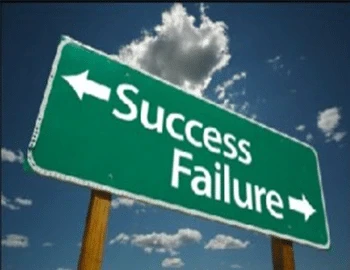
How To Get Your Resume Noticed And Be Successful In Your Job Search.
Reasons Why Your Resume Maybe Getting Ignored….
Have you been sending resumes out for a while now and not getting any responses? Well it may be your resume, but it may also be the nature of the industry and how employers are screening and searching for candidates these days.
As technology has grown employers now have a wealth of information at their fingertips, so the resume has become one of many tools employers use to screen and source candidates.
As a candidate you need to make sure you have all your bases covered to assure an employer will give you a call back. Here are a few tips to make sure your resume is read and an employer is prompted to call you back.
- Does your resume look professional? Make sure you have a professionally formatted resume. Resumes are images of you and your career. So making sure your resume is professionally worded and formatted is of prime importance.
- Make sure you name, address, phone number and email address is on your resume!! So many times candidates send out resumes without contact information or limited contact information on their resume. This is a sure turnoff for an employer to skip over your resume. They want to know if you are local, how to get ahold of you and talk with you. So make sure this information is at the top of each page of your resume.
- Use a professional email address. As a candidate you always want to put you best foot forward. Using email address that is not professional looking is a sure turn-off for an employer. The best email address format for your career should be your initials or first initial, last name formats, not vanity or lifestyle names.
- Make sure you have a LinkedIn Profile and it is up to date. In the last 5 years or so LinkedIn has become the recruiter’s site of choice to learn about candidates and your professional career. Many employers will check LinkedIn even before giving you a call back. So, make sure you profile is updated with a professional picture (not selfies) and career history. Attached writing samples or presentations you have made to your profile. Get endorsements from co-workers helps immensely.
- Clean up your social media. By searching google anyone anywhere can find you and what you have posted to the web. You want your image to be the most professional possible. So clean out those old tweets, Facebook posts, images that may not be so flattering to your career, as this will all impact if an employer will call you.
- Be present on google and other search engines as it is related to your career and profession. Join associations, post presentations, comment on industry websites forums. You want to show to the world you are a professional with the skills and qualifications to provide a valuable contribution to an organization in your industry.
- Don’t apply for 5 different positions at the same time in the same company. Believe it or not, your resume will probably be reviewed by the same person for each position you apply for. So, apply once and then follow-up. Don’t bombard and employer with many copies of your resume and do not repetitively call a hiring manager 20 times in one day. Plan out your application process with an employer and then proceed.
- Be Proactive. Do not just sit by the phone waiting for a call. Network with industry professionals, talk with hiring managers about their needs, and learn about companies and how you can make a contribution. Most employers hire based on who they know, so start meeting people. The applying for jobs over and over is just not going to do it in today’s marketplace.
- Use common sense. Most employers are human and want to hire good employees that care about their jobs and want to do a good job. So be yourself, think about the career you want and then pursue it. Do not just go out to the job market unprepared for your job search. Focus your efforts, get prepared and be consistent in your search efforts.
Following these few tips will allow you as a jobseeker to get that cherished call back from a potential employer and be successful in your job search. Finding the right position to advance your career to the next level may come from a surprising source and it may not be from just replying to job ads.
Michael DeSafey is a leading executive recruiter for professionals in the construction, engineering and environmental industries. He is currently the President of Webuild Staffing (www.webuildstaffing.com ). To learn more about Michael or Follow his Blog please visit www.michaeldesafey.com
